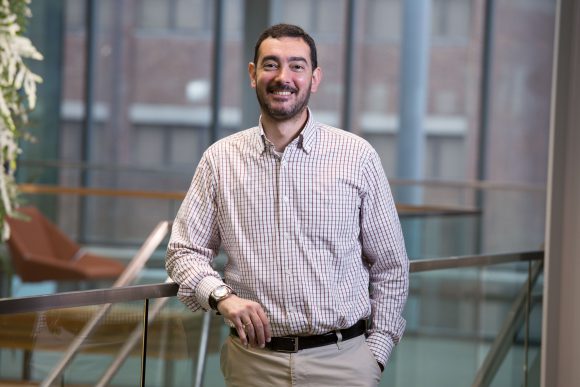
Alvaro Toledo, assistant professor in the Department of Entomology.
Alvaro Toledo is the new assistant professor in the Department of Entomology. His primary focus here at Rutgers will be to establish a research program on Lyme disease, ticks and the vector-borne pathogens at the Center for Vector Biology. He will be investigating the role of cholesterol in the development of Lyme disease.
Toledo received his M.S in Biology from the University of Oviedo before joining the School of Veterinary Sciences at Complutense University of Madrid, where he got his Ph.D in Microbiology with a dissertation on the infection dynamics of zoonotic agents in ticks from the Iberian Peninsula.
In 2008, he joined Jorge L. Benach’s laboratory at Stony Brook University as a post-doctoral fellow, where he studied the roles of the protease Lon-1 in the pathogenesis of Borrelia burgdorferi, the agent of Lyme disease, and characterized a relapsing fever Borrelia strain isolated from human patients.
In 2012, Toledo was promoted to research scientist and studied the role of the glycolytic enzyme enolase in the binding of plasminogen and subsequent activation into plasmin. Additionally, Toledo contributed to the discovery of novel membrane micro-domains (lipid rafts) in B. burgdoferi and was awarded a Career Development and Training grant from the NIH to study the role of proteins in the promotion of lipid rafts in B. burgdorferi. Toledo was then promoted in 2014 to research assistant professor at the Department of Molecular Genetics and Microbiology where he has continued his studies on lipid rafts and cholesterol. He was recently awarded an R21 from the NIAID-NIH to study the role of cholesterol in the pathogenesis Lyme disease.
Toledo is excited to be able to collaborate with faculty members here and to be a part of the Center for Vector Biology and long and successful story in vector control. “It is thrilling and a unique opportunity for someone working in vector-borne pathogens,” said Toledo.
Toledo grew up in small town close to Santander in northern Spain, between the mountains and gorgeous natural beaches made of fine sand. And when not immersed in studying ticks and vector-borne pathogens he enjoys playing soccer, reading, wine tasting, cider making and listening to music (The Boss and the E street band among his favorites.)
Editor’s Note: This faculty profile is part of an ongoing series highlighting new faculty hires and faculty promotions in the School of Environmental and Biological Sciences.

